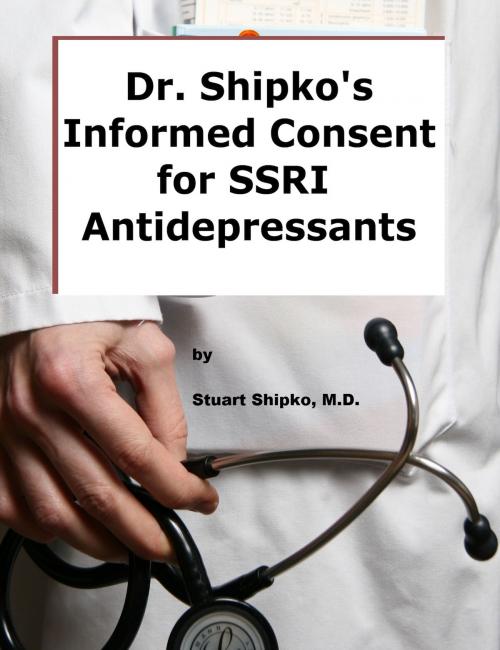Dr. Shipko's Informed Consent For SSRI Antidepressants
Nonfiction, Health & Well Being, Medical, Ailments & Diseases, Mental Health| Author: | Stuart Shipko | ISBN: | 9781301229598 |
| Publisher: | Stuart Shipko | Publication: | July 16, 2013 |
| Imprint: | Smashwords Edition | Language: | English |
| Author: | Stuart Shipko |
| ISBN: | 9781301229598 |
| Publisher: | Stuart Shipko |
| Publication: | July 16, 2013 |
| Imprint: | Smashwords Edition |
| Language: | English |
As a practicing psychiatrist for over 30 years, I have had ample experience working with antidepressants. Judging by what my patients tell me, psychiatric medications, SSRI antidepressants in particular, are prescribed to patients often with little or no information about the risks of taking these medications. When a patient consents for treatment, it should be with the full knowledge of the risks involved and alternative treatments available.
For most patients, antidepressants are safe and sometimes very effective for anxiety and depression. For some patients, they are not so helpful and patients experience side effects or withdrawal effects without having had proper warning that this might happen.
The decision to start a SSRI antidepressant is deceptively complex because of the risk of side effects and the risk of withdrawal symptoms on stopping the drugs.
Considerations related to stopping a SSRI are more controversial, as there have been no good studies on exactly what percentages of patients on SSRIs can expect to have withdrawal symptoms and a general failure to acknowledge prolonged withdrawal syndromes. These considerations are based on my own experiences with patients who suffer from prolonged withdrawal syndromes.
"Dr. Shipko's Informed Consent For SSRI Antidepressants" provides the clinical logic by which I approach starting and stopping SSRI antidepressants. It is not a specific guide to treatment. Information is intended to be discussed with your prescribing physician.
As a practicing psychiatrist for over 30 years, I have had ample experience working with antidepressants. Judging by what my patients tell me, psychiatric medications, SSRI antidepressants in particular, are prescribed to patients often with little or no information about the risks of taking these medications. When a patient consents for treatment, it should be with the full knowledge of the risks involved and alternative treatments available.
For most patients, antidepressants are safe and sometimes very effective for anxiety and depression. For some patients, they are not so helpful and patients experience side effects or withdrawal effects without having had proper warning that this might happen.
The decision to start a SSRI antidepressant is deceptively complex because of the risk of side effects and the risk of withdrawal symptoms on stopping the drugs.
Considerations related to stopping a SSRI are more controversial, as there have been no good studies on exactly what percentages of patients on SSRIs can expect to have withdrawal symptoms and a general failure to acknowledge prolonged withdrawal syndromes. These considerations are based on my own experiences with patients who suffer from prolonged withdrawal syndromes.
"Dr. Shipko's Informed Consent For SSRI Antidepressants" provides the clinical logic by which I approach starting and stopping SSRI antidepressants. It is not a specific guide to treatment. Information is intended to be discussed with your prescribing physician.















